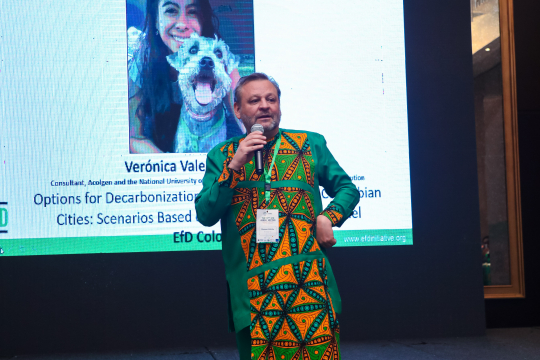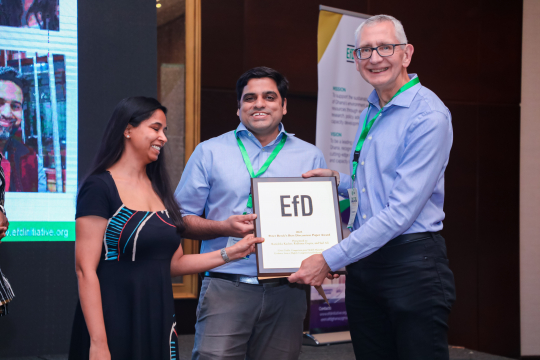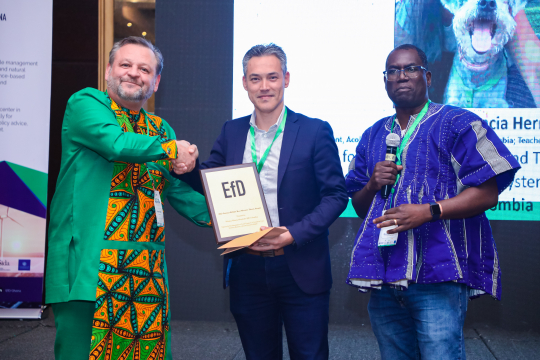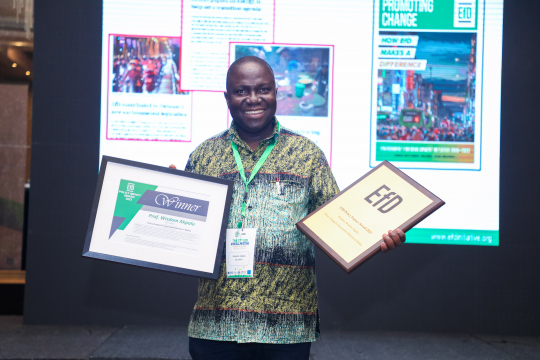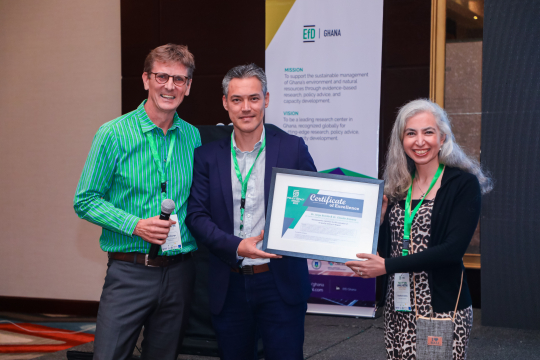EfD presents awards in three categories for outstanding work each year. The winners are announced at EfD’s Annual Meeting. The awards are Peter Berck’s Best Discussion Paper Award, the Gunnar Köhlin Best Master Thesis Award, and the EfD Policy Impact Award. The evaluation committees had, as usual, a tough job selecting the winners.
To win the Peter Berck’s Best Discussion Paper Award, you have to meet the following criteria: Involve researchers in Global South in an EfD-funded project, have policy relevance, and have excellent research design and analysis. EfD’s Research Committee reviews the submissions for this award and selects the winner.
The finalists were:
- Byela Tibesigwa, Herbert Ntuli and Telvin Muta: We can incorporate agriculture ecosystems into urban green economy in Tanzania: Dar es Salaam households are willing to pay
- Laura Villa Lobos, Julian D. Gomez, and Jorge H. Garcia: Technology attenuates the impact of heat on learning: Evidence from Colombia
- Kanishka Kacker, Ridhima Gupta, and Saif Ali: Does traffic congestion pose health hazards? Evidence from a highly congested and polluted city
And the winners of the Peter Berck’s Best Discussion Paper Award are Kanishka Kacker, Ridhima Gupta, and Saif Ali.
The Gunnar Köhlin Best Masters Thesis Award recognizes work satisfying the following criteria: Rigor in the application of environmental and resource economics, relevance in affecting policy to reduce poverty and increase sustainability, and clarity in writing that makes the text easily accessible and fun to read.
Based on the three external reviews, the winner was:
Veŕonica Valencia Hernández, EfD Colombia, for her thesis Options for decarbonization of land transport in Colombian cities: Scenarios based on a system dynamics model.
The EfD Capacity Development Committee, which selects the winner, also presented Certificates of Excellence to the runners-up:
Zhenjie Jin, EfD China, for the thesis The effect of climate change on mortality rate: Evidence from China and
Noela Sadikiel Ringo, EfD Tanzania, for Estimating the impact of electricity connection on education outcomes among primary school going children in Tanzania.
And finally, the EfD Impact Award was presented for the second time this year. The winner was Wisdom Akpalu, EfD Ghana, for his work to achieve: Policy change for sustainable fisheries in Ghana
Motivation: “Prof. Wisdom Akpalu’s research and policy engagement has played an instrumental role in the development and implementation of policies to make fisheries practices in Ghana more sustainable. Policy changes to which Prof. Akpalu has made important contributions include the use of video monitors on industrial trawlers, changes in mesh sizes, an alternative livelihood training support program, and the establishment of a Scientific and Technical Committee under the Fisheries Commission. His work on these politically sensitive topics, including harmful subsidies, is solidly built on facts and figures, and he has thereby gained the respect and trust of government officials as well as artisanal fisheries organizations.”
A Certificate of Excellence was awarded to the runner-up, Jorge Bonilla and Claudia Aravena, EfD Colombia in collaboration with Ricardo Morales, Universidad de Los Andes, Bogotá, Colombia for their work with:
Socioeconomic indicators for the evaluation of air quality policies in Bogotá.
An external committee was commissioned with the task of selecting the winner of the EfD Impact award. The distinguished members of this committee are:
Chantal Line Carpentier, Head Trade, environment, climate change, and sustainable development, UNCTAD Division of International Trade and Commodities
Pushpam Kumar, Chief Environmental Economist and Senior Economic Advisor, UN Environment Programme
Precious Zikhali, Senior Economist, the World Bank
Ernesto Sanchez-Triana, Global Lead for Pollution Management and Circular Economy, World Bank.
Congratulations to all the winners and a warm thank you to all the evaluation committees!
